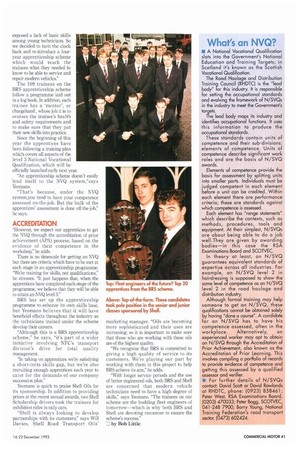What's an NVQ?
Page 43

If you've noticed an error in this article please click here to report it so we can fix it.
• A National Vocational Qualification slots into the Government's National Education and Training Targets; in Scotland it's known as the Scottish Vocational Qualification.
The Road Haulage and Distribution Training Council {RHDTC) is the "lead body" for this industry. It is responsible for setting the occupational standards and evolving the framework of N/SVQs in the industry to meet the Government's targets. The lead body maps its industry and identifies occupational functions. It uses this information to produce the occupational standards.
These standards contain units of competence and their sub-divisions: elements of competence. Units of competence describe significant work roles and are the basis of N/SVQ awards.
Elements of competence [provide the basis for assessment by splitting units into smaller parts. Individuals must be judged competent in each element before a unit can be credited. Within each element there are performance criteria; these are standards against which competence is assessed.
Each element has "range statements" which describe the contexts, such as methods, procedures, tools and equipment. At their simplest, N/SVQs are about being able to do a job well.They are given by awarding bodies—in this case the RSA Examinations Board and SCOTVEC.
In theory at least, an N/SVQ guarantees equivalent standards of expertise across all industries. For example, an N/SVQ level 2 in hairdressing is supposed to show the same level of competence as an N/SVQ level 2 in the road haulage and distribution industry.
Although formal training may help someone to get an N/SVQ, these qualifications cannot be obtained solely by having "done a course". A candidate for an N/SVQ has to have his competence assessed, often in the
workplace. Alternatively, an experienced worker may opt to obtain an N/SVQ through the Accreditation of Prior Achievement, also known as the Accreditation of Prior Learning. This involves compiling a portfolio of records to provide evidence of competence and getting this assessed by a qualified assessor and verifier.
For further details of N/SVQs contact: David Scott or David Rowlands at RHDTC, phone: (0923) 858461; Peter West, RSA Examinations Board, (0203) 470033; Peter Bogg, SCOTVEC, 041-248 7900; Barry Young, National Training Federation's road transport sector, (0473) 602424.




















































































